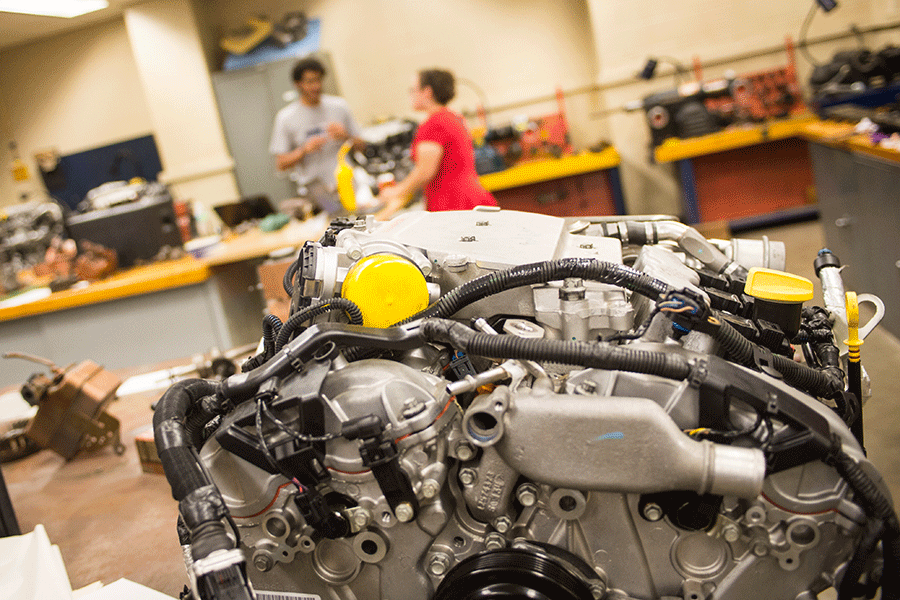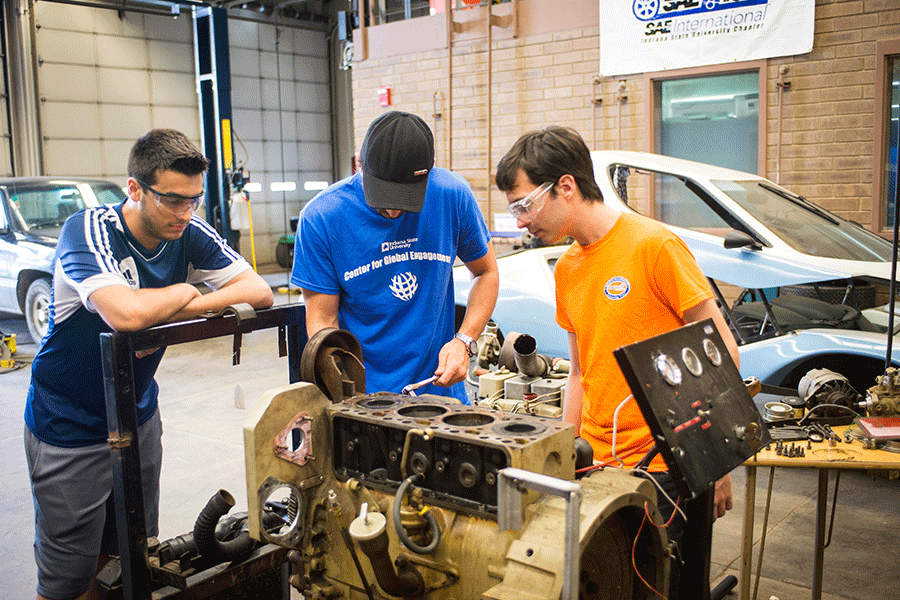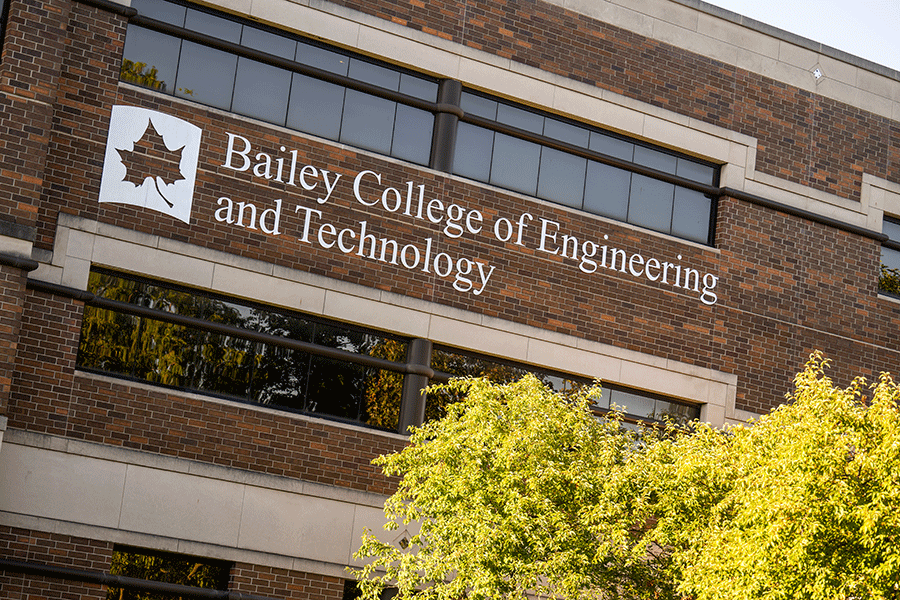Why Earn a Bachelor’s Degree in Automotive Engineering Technology at Indiana State?
Today’s globally competitive automotive industry must meet demand for increasingly smart, safe, cost-efficient vehicles.
Indiana State’s Automotive Engineering Technology Program prepares you as an industry professional who makes decisions based on sound management practices, fundamental engineering principles, and a thorough understanding of automobile technology to succeed in this rapidly evolving field.
Gain Experience in the Field before Graduation
Our program emphasizes managerial skills while assuring you a firm understanding of automotive operations. You will learn to solve technical problems through analysis and acquire knowledge of computer applications and information management skills.
You will gain real-world experience through participation in the Department’s Co-op/Internship Program, which combines on-campus study with work experience off campus. Companies that have sponsored co-op experiences include Allison Transmission, Buick Motor Division, Cummins, Inc., Electronic Data Systems, Honda, Jasper Engine, Mel Kenyon Racing, Toyota Motor Co., and United Parcel Service.
Learn from Our Excellent Faculty
Our faculty’s mission is to prepare application-oriented graduates with the technical and managerial skills necessary to enter globally competitive automotive careers. Courses in the major are taught by full-time professors who have extensive work experience in the field. The department offers small class sizes that allow for individual attention.
Enrich Your Learning with Great Resources and Opportunities
Your coursework will be centered in the University's John T. Myers Technology Center, which has more than 20 state-of-the-art laboratories. Students gain hands-on experience in testing, diagnosis, and repair of modern vehicles. Laboratory experiences include engine performance testing utilizing chassis and state-of-the-art engine dynamometers.
You may also participate in activities and organizations to interact with other students and industry professionals, including the Society of Automotive Engineers (SAE); the Society of Manufacturing Engineers (SME); and Epsilon Pi Tau, the international honorary for professions in technology.
What You’ll Learn in the Automotive Engineering Technology Program
As an automotive engineering technology major, you will learn about various disciplines within the automotive and wheeled transportation industries. In classroom and lab experiences, you will explore the design, theory of operation, and testing of modern automotive components used in road and off-road vehicles.
Although a minor is not required for completion of this degree, many students pursue a minor in a related area of interest, such as business, manufacturing, mechanical engineering, packaging, or safety.

Transfer Credit
Indiana State University accepts credit from regionally accredited colleges and universities within the United States, and from selected schools located outside the United States. Credit also may be granted for military training and experience. Previously earned college credit can be applied toward completion of the program per Indiana State's transfer guidelines.
Transfer GuidelinesCareer Possibilities for Automotive Engineering Technology Majors
The Automotive Engineering Technology Program prepares you for technical and managerial positions related to automobiles, trucks, agricultural equipment, construction equipment, and related fields.
Our graduates are employed in a variety of positions with major auto manufacturers, including Daimler Chrysler, Ford Motor Company, Honda of America, Toyota Motor Company of North America.
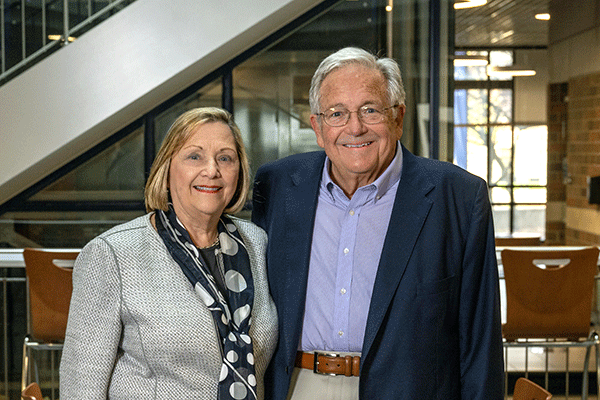
The Bailey College of Engineering and Technology
In 2022, Indiana State University announced its largest individual donation ever — $8 million from Steve and Gloria Bailey — and the ISU Board of Trustees approved the naming of the Bailey College of Engineering and Technology (BCET).
Steve Bailey is a 1970 Sycamore alumnus who graduated with a degree in automotive technology and went on to lead Diesel USA Group as CEO until his retirement in 2019. He serves on the BCET Dean’s Advisory Council and the ISU Foundation Board of Directors.
Steve attributes much of his success in his career to his time at Indiana State.
Learn more about Steve and Gloria Bailey.The Automotive Engineering Technology undergraduate program is accredited by the Engineering Technology Accreditation Commission of ABET, http://www.abet.org.
Mission
The mission of the Automotive Engineering Technology (AET) degree program at Indiana State University is to prepare application-oriented graduates with the technical and managerial skills necessary to enter globally competitive automotive careers.
Current automotive technology and design considerations are explored with emphasis on experiential learning opportunities engaging students in engine research, testing, design, and analysis. Students also develop essential managerial knowledge, skills and abilities assuring a comprehensive understanding of automotive operations ranging from retail to industrial applications.
Vision
The Automotive Engineering Technology degree program will be a leader in integrating teaching, research, and creative activity in an engaging, challenging, and supportive learning environment preparing productive citizens for Indiana and the world while creating and maintaining a credible presence within the automotive sector of education and industry.
Program Educational Objectives (PEOs)
Graduates two to three years into their career should have the foundation to:
- PEO 1 (Technology) - Apply disciplinary reasoning, critical thinking, and hands-on skills to identify, analyze, and solve problems.
- PEO 2 (Communicate) - Communicate effectively in both oral and written form to articulate technical knowledge, ideas, and proposals.
- PEO 3 (Management and/or Teamwork) - Perform effectively, think independently, and work collaboratively in a team environment in a membership or leadership role.
Student Outcomes (SOs)
Students at the time of graduation are prepared to demonstrate:
(1) An ability to apply knowledge, techniques, skills, and modern tools of mathematics, science, engineering, and technology to solve broadly defined engineering problems appropriate to the discipline;
(2) An ability to design systems, components, or processes meeting specified needs for broadly defined engineering problems appropriate to the discipline;
(3) An ability to apply written, oral, and graphical communication in broadly defined technical and non-technical environments; and an ability to identify and use appropriate technical literature;
(4) An ability to conduct standard tests, measurements, and experiments and to analyze and interpret the results to improve processes; and
(5) An ability to function effectively as a member as well as a leader on technical teams.
Related Programs
-
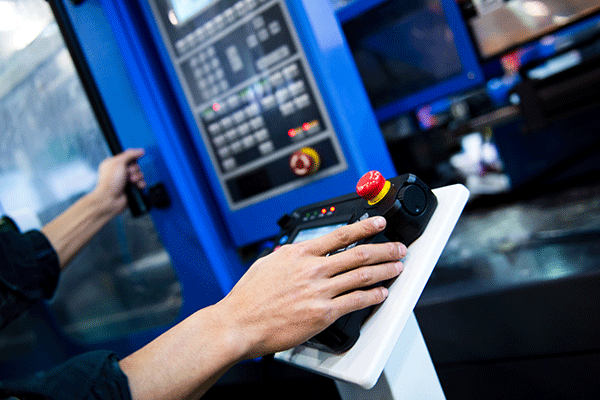
Automation and Control Engineering Technology (BS)
Bachelor's
-

Engineering Technology Management (BS)
Bachelor's
-
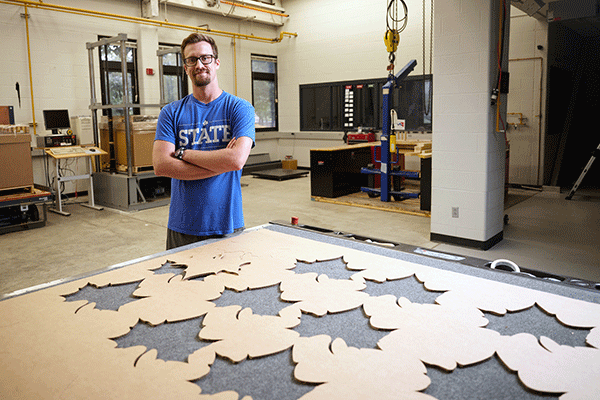
Manufacturing Engineering Technology (BS)
Bachelor's
